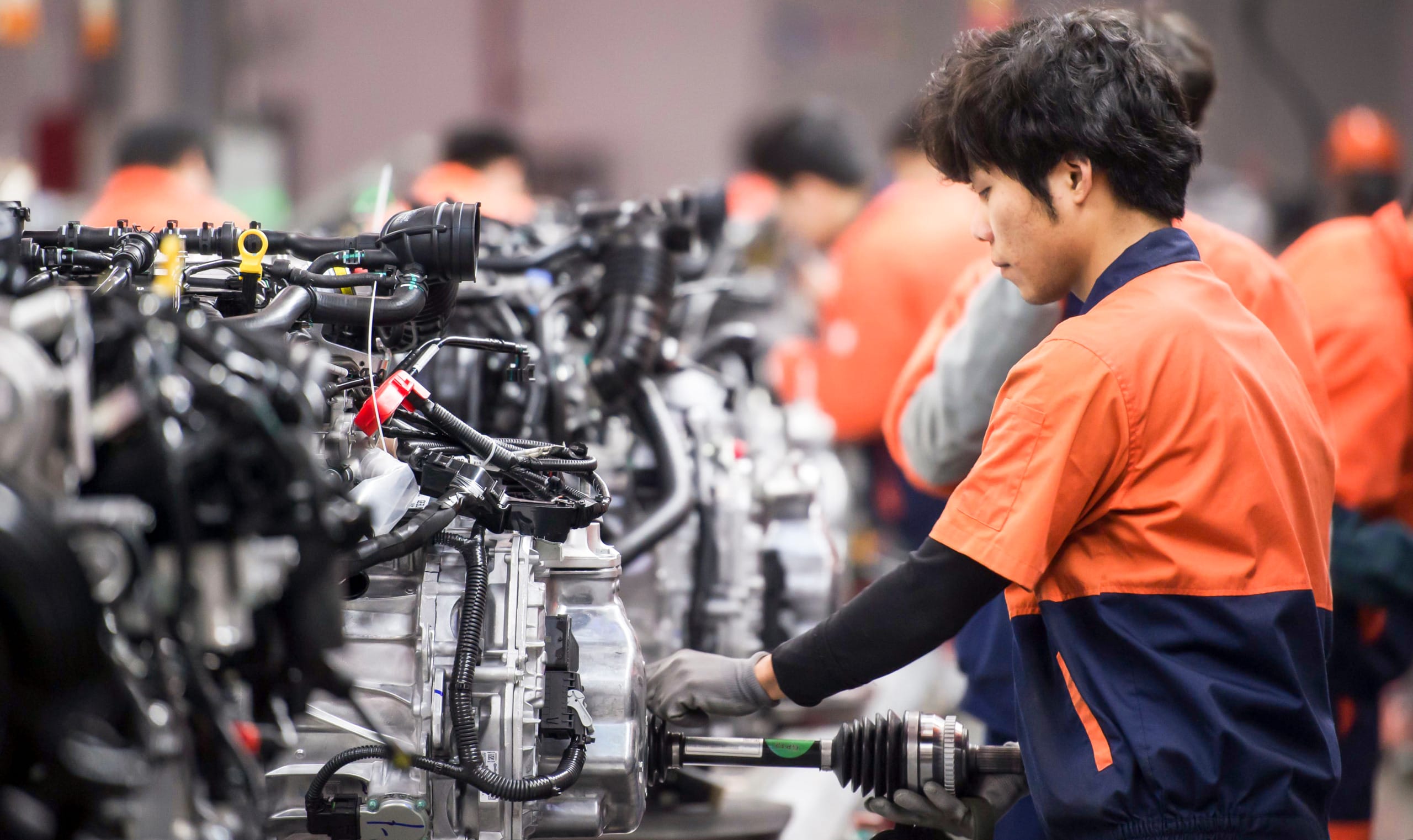Journalist Kristen Le Mesurier recently visited Shanghai to study supply chains. She writes exclusively for Mysmallbusiness on how SMEs can recognise and avoid the pitfalls when dealing with the world’s largest manufacturer. Just about everyone has heard a horror story about importing goods from China.Between June and September last year, three of the world’s largest toy manufacturers, including Mattel and Fisher-Price, were forced to recall more than 20 million toys worldwide because the toys’ paint was found to contain lead.
While these high-profile incidents are unlikely to stop the thousands of business owners looking to shift manufacturing offshore, they should serve as a clear warning: nothing short of an intricate strategy is needed to make manufacturing in China a success.
The experts warn that challenges arise at every stage in the sourcing process. Reputable manufacturers are hard to find. Some factories promise more than they can deliver, some ignore the order specifications altogether, and others simply pocket the cash without producing a product.
Trading companies are known to masquerade as manufacturers; product regulations are often misinterpreted or not followed; quality needs to be monitored during the production process and tested before the goods are shipped; contracts with dispute resolution clauses need to be negotiated; and delays are common at any stage in the process.
On top of all of this, when things go wrong there are few roads to recourse. Once container loads of goods arrive in Australia it becomes too expensive to send them back. The alternative, pursuing Chinese manufacturers through the courts, is time consuming, expensive, and hit and miss.
The bottom line, according to the experts, is that all of these variables must be controlled. Chinese manufacturers must be micromanaged.
Yet here is the frightening reality: few business owners follow any kind of strategy when outsourcing to China.
Lisa Goodhand, trade consultant and director of AJL Global, says the cost savings give business owners tunnel vision.
”Or worse than that, business owners import blindly. They figure that the different culture, the different laws, the work that needs to go in to building maintaining a relationship with a manufacturer, is all too hard. The goods are so cheap they figure they’ll risk it. They mentally prepare to throw their money to the wall,” Goodhand says.No one knows this better than John Hunt, who sits on the Australia China Business Council’s committee in Queensland, and runs Mox Group, an industrial hardware and software provider with more than 400 employees.He says that alongside wilful blindness, many business owners who come to the ACBC for advice have been arrogant in their dealings with Chinese manufacturers.
”The dictator approach runs something like this: ‘We know exactly what we want and we’re going to tell you how it needs to be done.’ That attitude is hardly conducive to a long term relationship,” Hunt says.
DealsDirect.com.au, a fast-growing online retailer with revenue of about $40 million in 2006-07, has been buying direct from Chinese manufacturers since 2005.
The founders, Michael Rosenbaum and Paul Greenberg, started out as most Australian business owners do – attending trade fairs and using a local agent.
But the big profits were out of reach while middle men carved out commissions.
”The future of retail is selling direct from the manufacturer in China to the customer’s front door,” Greenberg says.
They spent the first few months of 2005 testing their business model with trading companies (these are similar to wholesalers in Australia).
”It’s important to get comfortable before committing to sourcing on your own,” Greenberg says.
Their next step was to hire a Shanghainese buyer that had spent the previous decade working with Go-Lo – the pioneers of discount retailing in Australia – and open a small office in Shanghai.
Their representative then started sorting through the factories that presented at trade fairs and building relationships with those that had a strong reputation.
”Now that we’ve been in China for a few years manufacturers will travel to us [in Shanghai] and line up in the passage way to show us their wares,” Greenberg says.
Their Shanghai representative now runs an office of eight. He receives a commission for each product he sources himself, and he is paid a fee for maintaining close relationships with each of the factories DealsDirect buy from.A big part of his job is quality control. He gives factories 3-4 hours out of Shanghai spot checks and arranges for each container load to be randomly sampled before it leaves China’s ports. If faults are found the goods are sent back to the factory.”We do visit factories and I’ve never seen sweatshops. We wouldn’t deal with sweatshops. We go to professional factories that are impressive by any standards. Quality is important so the goods can’t be manufactured in a backyard,” Greenberg says.
Faulty products do occasionally reach Australian customers, but Greenberg says he has never dealt with a manufacturer that refuses to send replacements in a later shipment.
”If you go in there with the right attitude and work with courtesy you’re not going to be left in the lurch. In any case, the Chinese are looking for repeat business. They don’t want to sell one container, they want to sell 101 and more,” Greenberg says.
For business owners without the resources to hire a Chinese representative, the experts stress the importance of researching the manufacturer you plan to buy from.
”Especially with business to business portals like Ali Baba, it can be difficult to establish the true nature of the person holding themselves out as the manufacturer,” Goodhand says.
Goodhand outlines a common scenario. ”You strike up communication with someone who claims to be a manufacturer, you’re sent a sample and asked whether you like it. If you like it, you’re asked to transfer the money to a bank account and you’re told the goods will arrive soon. After waiting patiently, nothing arrives.
”But the only record you have of the contract of sale is a bank account number and a hotmail address. Impossible to track,” Goodhand says.
The importance of local knowledge and an understanding of business culture cannot be underestimated.
Gaffs are often made by Australian business owners when they jump on a plane to check out the Chinese manufacturer and turn up in board shorts and thongs while claiming loudly that they are the manufacturer’s next biggest client.
”Chinese businessmen would never send their CEO to do the groundwork straight away so it sends the signal that you’re not nearly as important as you present,” Goodham says.If you’re small, talk yourself up, says Austrade’s senior trade commissioner in China, Peter Osborne.”Talk about who you sell to, who your buyers are. Spruik your big clients. And make sure you meet the Chinese equivalent of yourself in the factory. If you’re the chief executive but you’ve never met your counterpart, they’re not taking you seriously,” Osborne says.
One lesson often painfully learned by Australian business owners is that every order placed has to be extremely clear and detailed.
Emails between DealsDirect staff and Chinese manufacturers are in dot points to minimise the risk of miscommunication.
”Ordering whatever you’ve seen in a picture, or even ordering the sample, will get you into trouble. You need to spell out exactly what you want. If you want the blue MP3 player you’ve got to specify the exact colour, size, and what accessories, if any, you expect to be included,” Goodhand says.
Negotiating a contract with each manufacturer is important. It forces each party to settle on procedures that kick in when something goes wrong. It is also an opportunity for the Australian business owner to gain respect and build a relationship with the manufacturer.
”The Chinese are likely to say yes to any order. They want to get their products out of the country. But they’ll work out the other party’s weaknesses very quickly.
”If in your eyes you don’t offer long term potential they will take advantage of whatever short term opportunity you represent. But if you can convince them that you’re serious and you’re the right company to work with, long term benefits will flow,” Hunt says.
”Or worse than that, business owners import blindly. They figure that the different culture, the different laws, the work that needs to go in to building maintaining a relationship with a manufacturer, is all too hard. The goods are so cheap they figure they’ll risk it. They mentally prepare to throw their money to the wall,” Goodhand says.
No one knows this better than John Hunt, who sits on the Australia China Business Council’s committee in Queensland, and runs Mox Group, an industrial hardware and software provider with more than 400 employees.
He says that alongside wilful blindness, many business owners who come to the ACBC for advice have been arrogant in their dealings with Chinese manufacturers.
”The dictator approach runs something like this: ‘We know exactly what we want and we’re going to tell you how it needs to be done.’ That attitude is hardly conducive to a long term relationship,” Hunt says.
DealsDirect.com.au, a fast-growing online retailer with revenue of about $40 million in 2006-07, has been buying direct from Chinese manufacturers since 2005.
The founders, Michael Rosenbaum and Paul Greenberg, started out as most Australian business owners do – attending trade fairs and using a local agent.
But the big profits were out of reach while middle men carved out commissions.
”The future of retail is selling direct from the manufacturer in China to the customer’s front door,” Greenberg says.
They spent the first few months of 2005 testing their business model with trading companies (these are similar to wholesalers in Australia).
”It’s important to get comfortable before committing to sourcing on your own,” Greenberg says.
Their next step was to hire a Shanghainese buyer that had spent the previous decade working with Go-Lo – the pioneers of discount retailing in Australia – and open a small office in Shanghai.
Their representative then started sorting through the factories that presented at trade fairs and building relationships with those that had a strong reputation.
”Now that we’ve been in China for a few years manufacturers will travel to us [in Shanghai] and line up in the passage way to show us their wares,” Greenberg says.
Their Shanghai representative now runs an office of eight. He receives a commission for each product he sources himself, and he is paid a fee for maintaining close relationships with each of the factories DealsDirect buy from.
A big part of his job is quality control. He gives factories 3-4 hours out of Shanghai spot checks and arranges for each container load to be randomly sampled before it leaves China’s ports. If faults are found the goods are sent back to the factory.
”We do visit factories and I’ve never seen sweatshops. We wouldn’t deal with sweatshops. We go to professional factories that are impressive by any standards. Quality is important so the goods can’t be manufactured in a backyard,” Greenberg says.
Faulty products do occasionally reach Australian customers, but Greenberg says he has never dealt with a manufacturer that refuses to send replacements in a later shipment.
”If you go in there with the right attitude and work with courtesy you’re not going to be left in the lurch. In any case, the Chinese are looking for repeat business. They don’t want to sell one container, they want to sell 101 and more,” Greenberg says.
For business owners without the resources to hire a Chinese representative, the experts stress the importance of researching the manufacturer you plan to buy from.
”Especially with business to business portals like Ali Baba, it can be difficult to establish the true nature of the person holding themselves out as the manufacturer,” Goodhand says.
Goodhand outlines a common scenario. ”You strike up communication with someone who claims to be a manufacturer, you’re sent a sample and asked whether you like it. If you like it, you’re asked to transfer the money to a bank account and you’re told the goods will arrive soon. After waiting patiently, nothing arrives.
”But the only record you have of the contract of sale is a bank account number and a hotmail address. Impossible to track,” Goodhand says.
The importance of local knowledge and an understanding of business culture cannot be underestimated.
Gaffs are often made by Australian business owners when they jump on a plane to check out the Chinese manufacturer and turn up in board shorts and thongs while claiming loudly that they are the manufacturer’s next biggest client.
”Chinese businessmen would never send their CEO to do the groundwork straight away so it sends the signal that you’re not nearly as important as you present,” Goodham says.If you’re small, talk yourself up, says Austrade’s senior trade commissioner in China, Peter Osborne.”Talk about who you sell to, who your buyers are. Spruik your big clients. And make sure you meet the Chinese equivalent of yourself in the factory. If you’re the chief executive but you’ve never met your counterpart, they’re not taking you seriously,” Osborne says.
One lesson often painfully learned by Australian business owners is that every order placed has to be extremely clear and detailed.
Emails between DealsDirect staff and Chinese manufacturers are in dot points to minimise the risk of miscommunication.
”Ordering whatever you’ve seen in a picture, or even ordering the sample, will get you into trouble. You need to spell out exactly what you want. If you want the blue MP3 player you’ve got to specify the exact colour, size, and what accessories, if any, you expect to be included,” Goodhand says.
Negotiating a contract with each manufacturer is important. It forces each party to settle on procedures that kick in when something goes wrong. It is also an opportunity for the Australian business owner to gain respect and build a relationship with the manufacturer.
”The Chinese are likely to say yes to any order. They want to get their products out of the country. But they’ll work out the other party’s weaknesses very quickly.
”If in your eyes you don’t offer long term potential they will take advantage of whatever short term opportunity you represent. But if you can convince them that you’re serious and you’re the right company to work with, long term benefits will flow,” Hunt says.
”Chinese businessmen would never send their CEO to do the groundwork straight away so it sends the signal that you’re not nearly as important as you present,” Goodham says.
If you’re small, talk yourself up, says Austrade’s senior trade commissioner in China, Peter Osborne.
”Talk about who you sell to, who your buyers are. Spruik your big clients. And make sure you meet the Chinese equivalent of yourself in the factory. If you’re the chief executive but you’ve never met your counterpart, they’re not taking you seriously,” Osborne says.
One lesson often painfully learned by Australian business owners is that every order placed has to be extremely clear and detailed.
Emails between DealsDirect staff and Chinese manufacturers are in dot points to minimise the risk of miscommunication.
”Ordering whatever you’ve seen in a picture, or even ordering the sample, will get you into trouble. You need to spell out exactly what you want. If you want the blue MP3 player you’ve got to specify the exact colour, size, and what accessories, if any, you expect to be included,” Goodhand says.
Negotiating a contract with each manufacturer is important. It forces each party to settle on procedures that kick in when something goes wrong. It is also an opportunity for the Australian business owner to gain respect and build a relationship with the manufacturer.
”The Chinese are likely to say yes to any order. They want to get their products out of the country. But they’ll work out the other party’s weaknesses very quickly.
”If in your eyes you don’t offer long term potential they will take advantage of whatever short term opportunity you represent. But if you can convince them that you’re serious and you’re the right company to work with, long term benefits will flow,” Hunt says.
 https://baysourceglobal.com/wp-content/uploads/2024/04/shutterstock_774597796-scaled.jpeg
1522
2560
dwatts
https://baysourceglobal.com/wp-content/uploads/2013/04/BSG-new-logo-large1-e1426014540772.jpg
dwatts2024-04-10 01:06:582024-04-10 01:06:59Assessing China's Prospects as the Premier Low-Cost Manufacturing Hub: A Five-Year Outlook
https://baysourceglobal.com/wp-content/uploads/2024/04/shutterstock_774597796-scaled.jpeg
1522
2560
dwatts
https://baysourceglobal.com/wp-content/uploads/2013/04/BSG-new-logo-large1-e1426014540772.jpg
dwatts2024-04-10 01:06:582024-04-10 01:06:59Assessing China's Prospects as the Premier Low-Cost Manufacturing Hub: A Five-Year Outlook https://baysourceglobal.com/wp-content/uploads/2024/04/shutterstock_487208737-scaled.jpeg
1704
2560
dwatts
https://baysourceglobal.com/wp-content/uploads/2013/04/BSG-new-logo-large1-e1426014540772.jpg
dwatts2024-04-10 00:57:092024-04-16 18:14:50Making Strategic Manufacturing Decisions: Owning vs. Outsourcing (Make vs. Buy)
https://baysourceglobal.com/wp-content/uploads/2024/04/shutterstock_487208737-scaled.jpeg
1704
2560
dwatts
https://baysourceglobal.com/wp-content/uploads/2013/04/BSG-new-logo-large1-e1426014540772.jpg
dwatts2024-04-10 00:57:092024-04-16 18:14:50Making Strategic Manufacturing Decisions: Owning vs. Outsourcing (Make vs. Buy) https://baysourceglobal.com/wp-content/uploads/2024/03/christian-lue-2Juj2cXWB7U-unsplash-scaled.jpeg
1707
2560
dwatts
https://baysourceglobal.com/wp-content/uploads/2013/04/BSG-new-logo-large1-e1426014540772.jpg
dwatts2024-03-13 14:57:122024-03-13 15:44:25A Tale of Two Wages: Hourly Labor Rates in China vs. the U.S. Over the Past Decade
https://baysourceglobal.com/wp-content/uploads/2024/03/christian-lue-2Juj2cXWB7U-unsplash-scaled.jpeg
1707
2560
dwatts
https://baysourceglobal.com/wp-content/uploads/2013/04/BSG-new-logo-large1-e1426014540772.jpg
dwatts2024-03-13 14:57:122024-03-13 15:44:25A Tale of Two Wages: Hourly Labor Rates in China vs. the U.S. Over the Past Decade
Follow Us